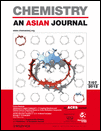
Chemistry-An Asian Journal
Scope & Guideline
Connecting Scientists with Premier Research Insights.
Introduction
Aims and Scopes
- Materials Chemistry:
The journal frequently publishes research on the synthesis, characterization, and application of novel materials, including nanomaterials, polymers, and composites, with a focus on their functional properties and potential applications in energy, electronics, and biomedicine. - Catalysis and Reaction Mechanisms:
A significant portion of the articles focuses on catalytic processes, including the development of new catalysts, mechanistic studies, and applications in organic transformations, emphasizing sustainability and efficiency. - Electrochemistry and Energy Storage:
The journal covers advancements in electrochemical systems, including batteries, supercapacitors, and fuel cells, highlighting innovative materials and designs that enhance energy storage and conversion. - Sensing and Biosensing Technologies:
Research on the development of chemical sensors for environmental monitoring, disease diagnosis, and food safety is a prominent theme, showcasing novel sensing mechanisms and materials. - Biomolecular Chemistry:
The journal features studies on biomolecules, including their synthesis, modification, and application in therapeutic and diagnostic contexts, emphasizing the intersection of chemistry and biology. - Green Chemistry and Sustainability:
The journal encourages research that promotes environmentally friendly practices in chemistry, including the development of sustainable methods for chemical synthesis and waste reduction.
Trending and Emerging
- Sustainable Chemistry and Green Approaches:
There is an increasing emphasis on sustainable practices, including the development of green synthesis methods, materials recycling, and the use of renewable resources, aligning with global sustainability goals. - Nanotechnology and Nanomaterials:
Research on nanomaterials, including their synthesis, characterization, and applications in catalysis, drug delivery, and electronics, is rapidly growing, highlighting the significance of nanoscale phenomena in chemistry. - Artificial Intelligence and Machine Learning in Chemistry:
The integration of AI and machine learning techniques for predicting chemical behaviors, optimizing reactions, and designing new materials is emerging as a vital area of research, showcasing the intersection of computational and experimental chemistry. - Biomedical Applications of Chemical Compounds:
There is a noticeable trend towards exploring the biomedical applications of chemical compounds, including drug design, delivery systems, and diagnostic tools, reflecting the growing need for innovative healthcare solutions. - Electrocatalysis and Energy Conversion:
Research in electrocatalysis, particularly in the context of energy conversion and storage technologies, is gaining momentum, focusing on efficient methods for CO2 reduction and hydrogen production. - Photocatalysis and Solar Energy Utilization:
The utilization of photocatalysis for environmental remediation and energy production through solar-driven processes is on the rise, reflecting the increasing interest in harnessing renewable energy.
Declining or Waning
- Traditional Organic Synthesis:
While organic synthesis remains a core area, the focus on traditional methods without innovative modifications or applications is diminishing as researchers seek more efficient and sustainable alternatives. - Homogeneous Catalysis without Novel Approaches:
Research that presents homogeneous catalysis with established methods and without significant advancements or novel insights has seen reduced publication frequency, as the field increasingly values innovative and transformative approaches. - Inorganic Chemistry with Limited Applications:
Studies in inorganic chemistry that do not explore practical applications or interdisciplinary connections are becoming less prominent, as the journal prioritizes research with clear relevance to real-world problems. - Classical Coordination Chemistry:
The publication of classical coordination chemistry studies, particularly those lacking novel findings or applications, is declining, reflecting a shift towards more dynamic and application-driven research. - Theoretical Studies with Limited Experimental Validation:
Theoretical studies that do not include strong experimental validation or practical implications are facing reduced interest, as the journal seeks to publish work that bridges theoretical insights with experimental findings.
Similar Journals
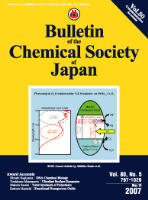
BULLETIN OF THE CHEMICAL SOCIETY OF JAPAN
Empowering Discoveries: Your Gateway to Chemical InsightsBULLETIN OF THE CHEMICAL SOCIETY OF JAPAN, published by the esteemed Chemical Society of Japan, serves as a pivotal platform for the dissemination of cutting-edge research in the multifaceted field of chemistry. With an ISSN of 0009-2673 and an E-ISSN of 1348-0634, this journal has been integral in fostering the growth of chemical sciences globally since its inception in 1965. The journal holds an impressive Q2 ranking in the Chemistry (miscellaneous) category, indicating its relevance and influence within the academic community, as reflected by its Scopus rank of #104/408, placing it in the 74th percentile. Although it is not an open-access journal, its rich content, which spans a wide range of topics in general chemistry, remains highly valued by researchers, professionals, and students alike, affirming its crucial role in advancing both theoretical knowledge and practical applications in chemistry. As it converges towards 2024, the bulletin continues to uphold its commitment to excellence in scientific communication and research dissemination in Japan and beyond.
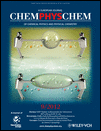
CHEMPHYSCHEM
Advancing the Frontiers of Chemistry and PhysicsCHEMPHYSCHEM, published by WILEY-V C H VERLAG GMBH in Germany, stands as a pivotal resource for researchers and professionals in the fields of Atomic and Molecular Physics, as well as Physical and Theoretical Chemistry. With a commendable impact across its converged years from 2000 to 2024, the journal is categorized in the second quartile (Q2) for both aforementioned fields according to the 2023 metrics, underscoring its significance in advancing scientific dialogue and research. CHEMPHYSCHEM is committed to disseminating high-quality, peer-reviewed research articles that delve into the intricate interplay between chemistry and physics, making it an essential read for students and experts alike. The journal does not currently offer open access options, allowing for focused scholarly discussions that cater to the academic community's needs. As reflected in its Scopus rankings, CHEMPHYSCHEM maintains respectable standings, ranking #84/224 and #90/189 in its respective categories, demonstrating its commitment to high-impact research and innovation.
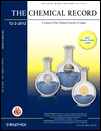
CHEMICAL RECORD
Exploring the Frontiers of Chemical KnowledgeThe Chemical Record is a prestigious peer-reviewed journal published by WILEY-V C H VERLAG GMBH, focusing on innovative research and developments across the diverse and evolving fields of chemistry and biochemistry. With an esteemed 2023 Impact Factor and recognized as a Q1 journal in several categories—including Biochemistry, Chemical Engineering, and Materials Chemistry—The Chemical Record stands as a critical resource for researchers, professionals, and students aiming to disseminate and acquire knowledge in these disciplines. The journal's engaging scope covers contemporary topics and fosters collaboration within the global scientific community, ensuring accessibility to cutting-edge research. By publishing articles that meet the highest standards of scholarship, it has earned a significant place within the academic ecosystem, as reflected in its strong Scopus rankings. Although The Chemical Record operates without open access, it remains deeply committed to advancing the field of chemistry through rigorous and impactful publications that bridge gaps between theory and practice.

CHINESE JOURNAL OF CHEMISTRY
Fostering dialogue and discovery in chemistry.The CHINESE JOURNAL OF CHEMISTRY, published by WILEY-V C H VERLAG GMBH, is a distinguished peer-reviewed journal that has been contributing to the field of chemistry since its inception in 1990. With an impressive Q1 ranking in the Chemistry (miscellaneous) category and a Scopus rank of 67 out of 408, this journal is recognized for its rigorous scholarly standards and significant impact within the academic community. Renowned for publishing high-quality research, reviews, and insightful commentaries, the journal serves as a vital resource for researchers, professionals, and students keen on advancing their understanding of general chemistry and its applications. Although it does not offer open access, the journal remains an essential outlet for innovative chemistry research, attracting contributions from a global network of specialists. With its broad scope covering various aspects of chemistry and a commitment to fostering scientific dialogue, the CHINESE JOURNAL OF CHEMISTRY is poised to continue its role as a central pillar in the ever-evolving landscape of chemical sciences.

ACS Organic & Inorganic Au
Advancing the Frontiers of ChemistryACS Organic & Inorganic Au, published by the American Chemical Society, stands as a premier open-access journal dedicated to advancing the fields of organic and inorganic chemistry. Since its inception in 2021, this journal has swiftly risen to prominence, achieving a commendable Q1 classification in Inorganic Chemistry, Organic Chemistry, and Physical and Theoretical Chemistry as of 2023. With an ISSN of 2694-247X, it provides a vital platform for researchers, professionals, and students to disseminate their findings and engage with cutting-edge work across converged disciplines. Operating from its headquarters in Washington, DC, ACS Organic & Inorganic Au is committed to fostering a collaborative research environment, encouraging rigorous peer review, and ensuring the wide accessibility of high-quality scholarly articles. With its open-access model, readers worldwide can freely access and utilize research findings, promoting a global exchange of knowledge crucial for driving innovation in chemistry.
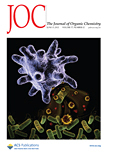
JOURNAL OF ORGANIC CHEMISTRY
Driving Progress in the World of Organic ChemistryJournal of Organic Chemistry, published by the American Chemical Society, is a prestigious peer-reviewed journal dedicated to advancing the field of organic chemistry. With an ISSN of 0022-3263 and an E-ISSN of 1520-6904, this journal has established itself as a key platform for disseminating high-quality research since its inception in 1936. Residing in the Q2 category for Organic Chemistry as of 2023, it ranks #64 out of 211 in Scopus, positioning itself within the top 69th percentile of its field. Researchers and professionals can access vital findings and innovative methodologies that drive the understanding and application of organic chemical principles. Although the journal is not open access, it remains a crucial resource in academia and industry, contributing significantly to the scientific community's knowledge base. For detailed insights and cutting-edge research, the journal continues to be an essential read for those engaged in the dynamic and evolving landscape of organic chemistry.
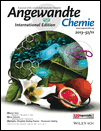
ANGEWANDTE CHEMIE-INTERNATIONAL EDITION
Connecting Researchers with the Latest in Chemical ResearchANGEWANDTE CHEMIE-INTERNATIONAL EDITION, published by WILEY-V C H VERLAG GMBH, stands as a leading journal in the fields of Chemistry and Catalysis, holding a prestigious position with a Q1 ranking in both categories as of 2023. With an ISSN of 1433-7851 and an E-ISSN of 1521-3773, this esteemed publication has been an invaluable resource for the global scientific community since its inception in 1962. The journal's impact is further underscored by its remarkable Scopus rankings, where it occupies the 13th place among 408 journals in General Chemistry and the 4th place among 68 in Chemical Engineering - Catalysis, marking it in the 96th and 94th percentiles, respectively. Although it does not offer Open Access, ANEWANDTE CHEMIE-INTERNATIONAL EDITION remains essential for researchers, professionals, and students seeking to stay abreast of cutting-edge developments and innovations in chemical sciences. Its comprehensive scope and rigorous peer-review process ensure that only the highest quality research finds its way to publication, contributing significantly to the advancement of chemistry worldwide.
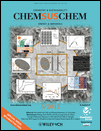
ChemSusChem
Transforming Challenges into Sustainable InnovationsChemSusChem is a premier interdisciplinary journal, published by WILEY-V C H VERLAG GMBH, that focuses on the critical fields of Chemical Engineering, Energy, Environmental Chemistry, and Materials Science. Since its inception in 2008, the journal has consistently maintained a Q1 ranking across multiple categories, highlighting its role as a vital resource for researchers and professionals dedicated to advancing sustainable chemical processes and technologies. With an impressive impact factor, it ranks 12th in General Chemical Engineering and is highly regarded within its scopes, indicating the journal's commitment to publishing high-quality, innovative research that addresses global challenges in energy and environmental sustainability. Though it operates on a subscription model, its contributions are essential for those in academia and industry seeking cutting-edge developments in sustainable chemistry. As it approaches its convergence span through 2024, ChemSusChem continues to shape the future of sustainable chemistry, making it a must-read for students, researchers, and practitioners alike.
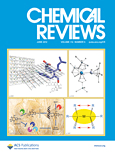
CHEMICAL REVIEWS
Pioneering Reviews for the Modern Chemist.Chemical Reviews, published by the American Chemical Society, is a leading journal in the field of chemistry, renowned for its comprehensive and authoritative reviews on a wide range of chemical topics. With its ISSN 0009-2665 and E-ISSN 1520-6890, this prestigious journal has maintained a remarkable trajectory since its inception in 1924, continuously contributing to advancements in the chemical sciences. As a Q1 journal in the Chemistry (miscellaneous) category, it stands at the forefront of research, boasting an impressive Scopus rank of #1 out of 408 in the field of General Chemistry, positioning it within the top 1% of the field. Chemical Reviews offers invaluable insights and serves as a critical resource for researchers, professionals, and students alike, facilitating knowledge exchange and fostering innovation in chemistry. While currently not open access, it remains a vital component of the scientific community, gathering an extensive readership base eager for the latest developments, methodologies, and theoretical frameworks in this dynamic discipline.
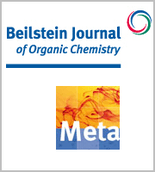
Beilstein Journal of Organic Chemistry
Exploring groundbreaking discoveries in organic chemistry.The Beilstein Journal of Organic Chemistry, published by the renowned BEILSTEIN-INSTITUT, stands as a pivotal platform for advancing the field of organic chemistry since its inception in 2005. With its commitment to Open Access publishing, this journal enables global readership and collaboration, fostering the dissemination of high-quality research. Operating from Germany, the journal has carved out a significant reputation, currently holding a Q2 ranking in the Organic Chemistry category, with impressive Scopus rankings placing it at #91 out of 211 in the field, achieving a 57th percentile. The Beilstein Journal is dedicated to publishing cutting-edge findings that span the breadth of organic chemistry, including synthetic methodologies, catalysis, and material sciences, making it an essential resource for researchers, professionals, and students looking to stay at the forefront of organic chemistry advancements. With a vision to enhance collaboration and knowledge sharing within the scientific community, the journal plays a vital role in shaping the future of organic chemistry research.